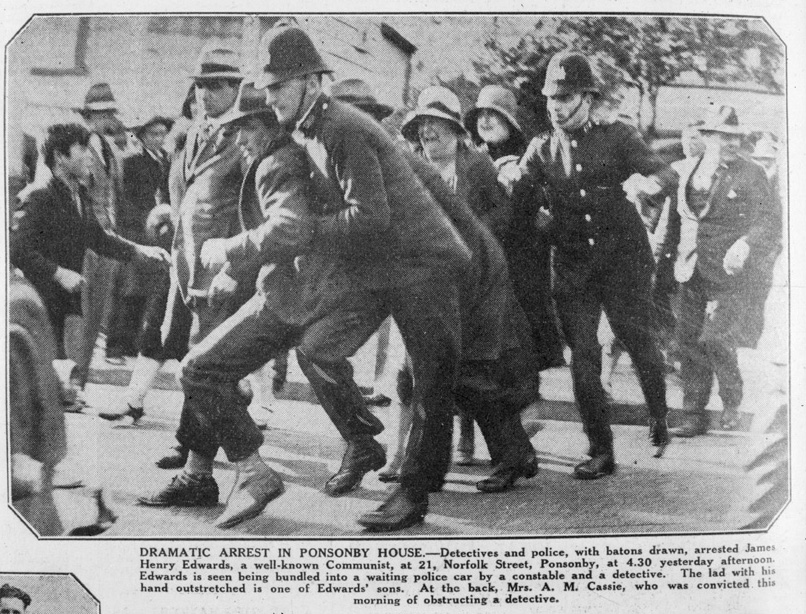Anyone keeping an eye on Palestine, Myanmar, Western Sahara, or any other state repression, has witnessed two familiar opposing narratives emerge. On one hand, the mass counter-repression response is a reminder that collective action can raise an internationalist solidarity response. On the other, the reactionary voice of nationalism rears its ugly head, from both the political left and right.
While both left and right nationalism essentially boils down to the insidious mantra “we must look after our own first!” the character of each form is related but distinct. Rightwing nationalism overtly diverts proletarian unity on the basis of class to cross-class unity between workers and capitalists within their nation.
This capitalist nationalism is far and away the dominant strand of thought within the state and through large media outlets. When election time rolls around, the political parties go to great lengths to articulate how their policies would enrich all people of the nation, despite history teaching us that the capitalist class grows rich out of the suppression of the pay, working conditions and welfare of the working masses.
Left-nationalists weaken socialist thought on two fronts. Firstly by faulty analyses that muddy the waters of where we draw political lines, chopping and changing class lines with national ones. And secondly, by giving rightwing nationalists a leftist punching bag to tackle in media interviews and debates, rather than having to deal with voices for true internationalism.
Left nationalism is, unfortunately, particularly prevalent within New Zealand trade unionism, where it mingles with tepid reformism and fear that internationalism will drive off chauvinist members and their dues. Admirable exceptions exist, but anybody involved in trade unionism has heard arguments against drawing controversial political lines in solidarity with liberation movements abroad for fear of angering nationalist-minded members. We seem to have arrived at an unfortunate paradigm where the primary functions of the average union are limited to legal defence work and constrained collective bargaining.
This nationalism flourishes where internationalist grassroots work and union power is weakest. It is difficult to generate a culture of internationalist resistance through solidarity strikes when they are specifically outlawed. A spirit of both solidarity and a willingness to break the law is necessary amongst unionised workforces in order to take solidarity action. Looking beyond the unions, the New Zealand working class has no political party which is not explicitly nationalist in its politics. Internationalist political education and action is the exclusive preserve of small leftwing groups, such as the International Socialist Organisation.
Internationalism is a defining principle for any serious revolutionary socialist movement – we know that the divide that drives to the heart of societal conditions is the class divide, and that the working class the world over has an interest in abolishing capitalism, implementing socialism, and eventually doing away with national borders.
Returning to the “we need to look after our own first” comment, the power of this argument lies in the lack of promotion of an alternative definition of who “our own” really are. Otherwise, they are assumed to be New Zealand born. Perhaps we do need to look after our own, but with our own definition: as people who work for a living in workplaces run for profit, workplaces where we spend a huge amount of our time and energy, but are run as thousands of petty tyrannies, where we have almost no power, except where there is union organisation. In other words, “our own” are toilers the world over who share a common interest in getting rid of capitalism.
It is for this reason that one of our top priorities as socialists should be to channel the power of trade unionism, where possible, to the struggle for migrants’ rights, because migrant workers share the same interests as all workers while standing on much more precarious ground. The weaker political position of migrants makes them vulnerable to working for low wages and in bad conditions. The exploitation of migrants could drive wages down for all precarious workers who compete in the labour market. The solution is not to stop migrants from entering the country, but to recruit them to the union and strengthen the position of all workers. Migrant workers are in every way “our own” as the capitalist class of New Zealand could never be.
Thousands of threads of global capital and financial imperialism tie the world closer and closer together. While wealthy capitalists and the state they are intertwined with speak the language of nationalism, they understand the value of internationalist thinking more intimately than the masses do, though with an eye to exploitation and profit rather than class consciousness. Right now, the lessons unionists, and workers more broadly, need to learn can be gleaned from workers who, by the nature of their work, are forced to think internationally. Of particular note are the maritime unions internationally that in recent months have refused to unload Israeli cargo ships or work with the illegitimate Burmese Tatmadaw junta. Here in Aotearoa, the Rail and Maritime Transport Union has protested the import of blood phosphate from Western Sahara and called for a trade deal that includes Myanmar not to be ratified.
These examples offer insight into how workers can act internationally, exert their own political will and deal blows in favour of politically weaker or more repressed groups within the global proletariat. What we need are stronger political organisations and trade unions outside of the bourgeois parliamentary framework that take a principled stance against nationalist division by communicating and coordinating internationally. We need to act with genuine solidarity whenever our side is under attack and not just talk.









